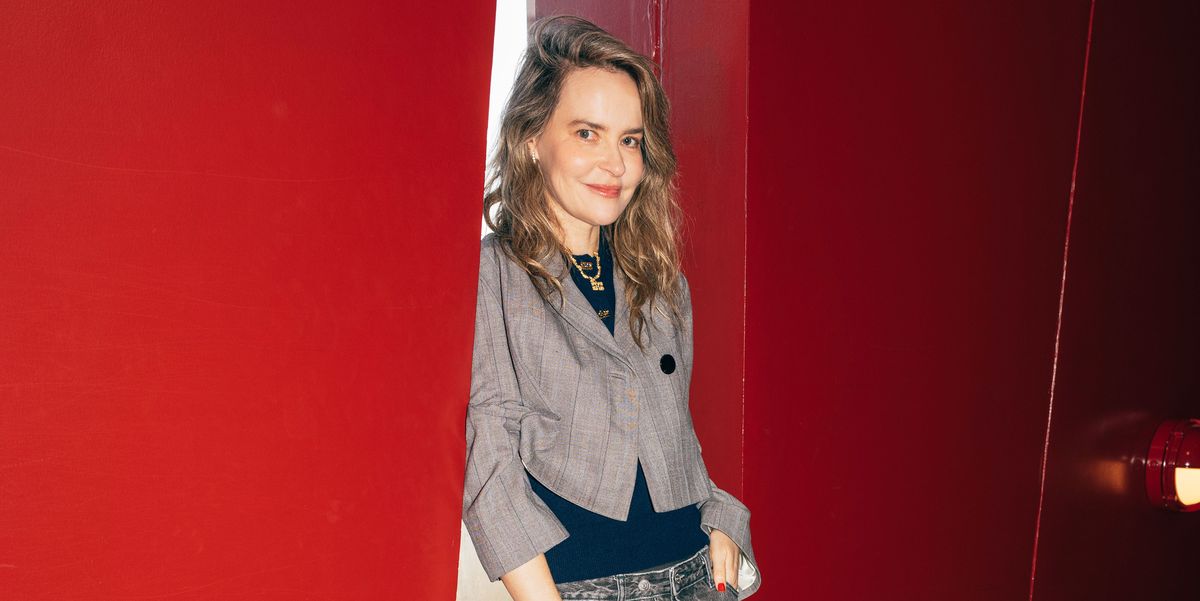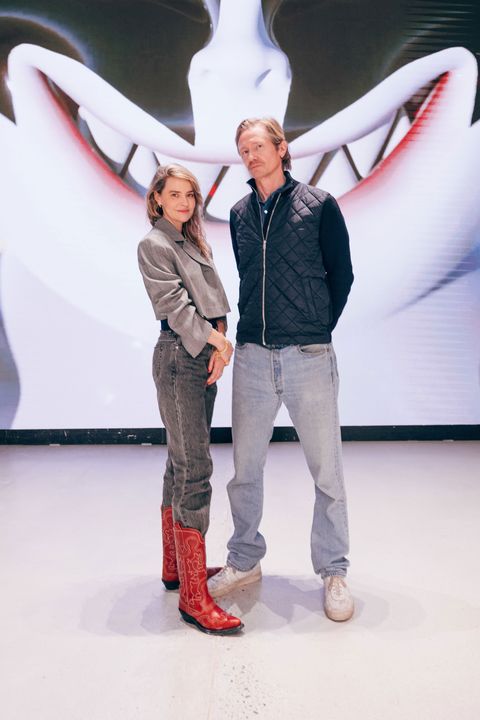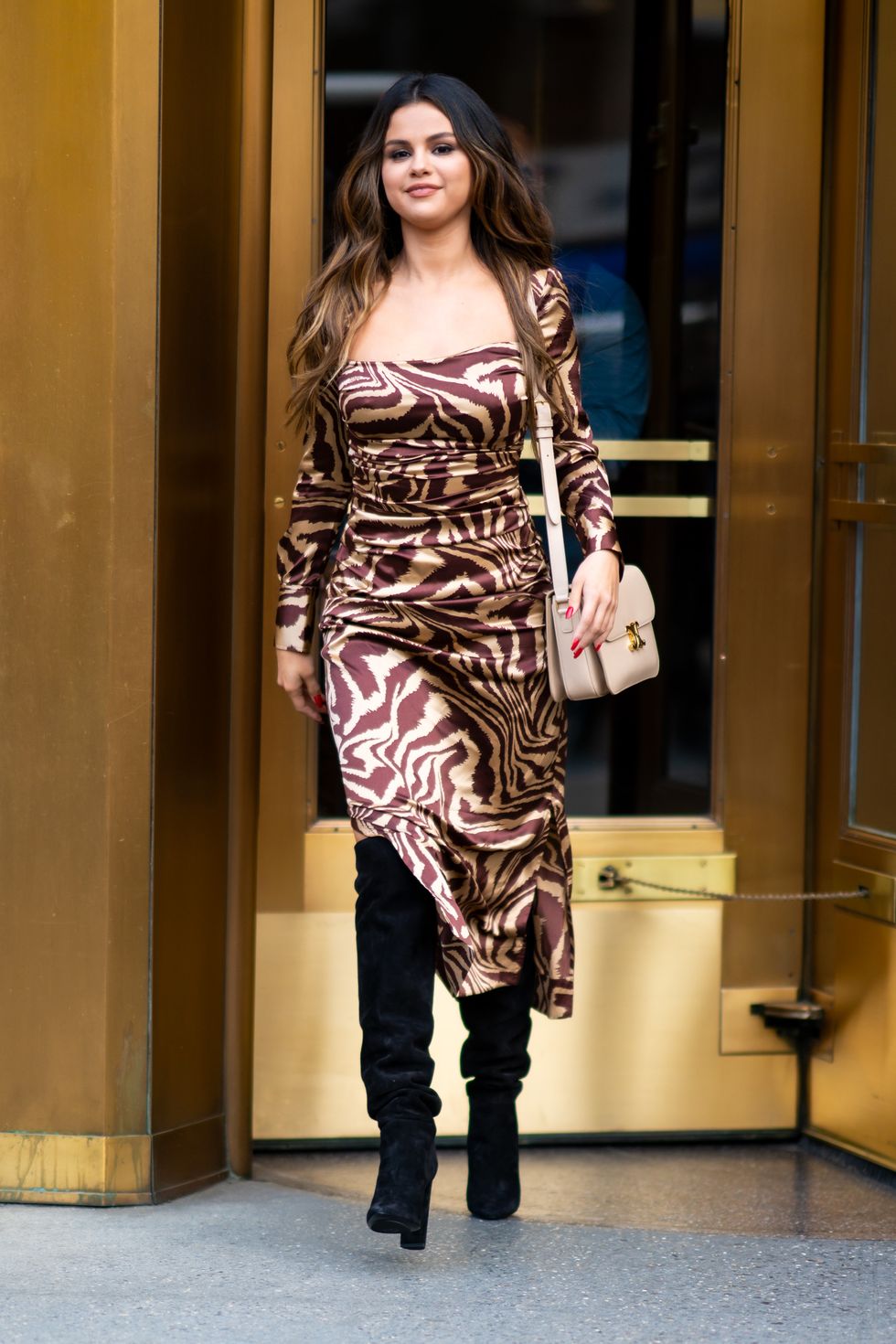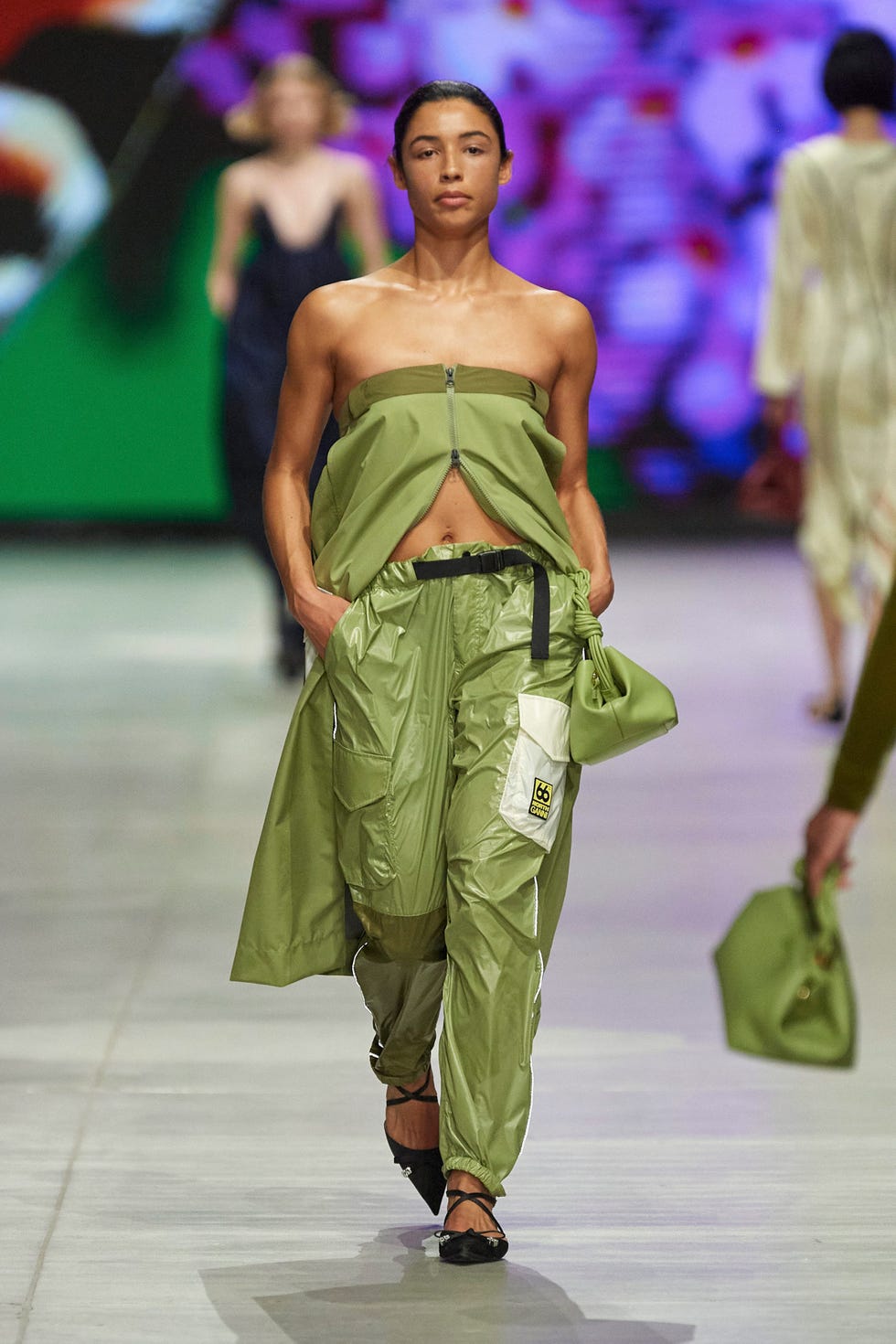Products You May Like
Where were you when you first heard about Ganni? Many fashion lovers—myself included—discovered the Scandinavian brand thanks to other cool girls wearing it, in an “I saw Cady Heron wearing army pants and flip-flops, so I bought army pants and flip-flops” kind of way, as one told me. The bright and playful yet sophisticated designs are both on trend and allow for myriad ways to express one’s personal style. Originally founded in 2000 by Frans Truelsen, the brand was taken over in 2009 by husband and wife duo Ditte and Nicolaj Reffstrup, serving as the creative director and CEO of the brand, respectively. For Ditte, she felt that there was something missing in Scandinavian style at the time. “The world hadn’t seen the best of Copenhagen yet. There were so many people that I was super inspired by every day…that balance of mixing super feminine stuff with sportier styles, or denim, or sneakers.” Clearly, her instincts were correct—Ganni now has 52 stores across the world and grew its revenue by a whopping 34 percent in 2021.
And just within the last couple of months, Olivia Rodrigo and Kourtney Kardashian have posted themselves wearing Ganni on their Instagrams. So, what happens when a beloved cult brand begins to hit the mainstream zeitgeist? Ganni entered Washington Post fashion writer Rachel Tashjian Wise’s orbit in 2019, when she said “it was suddenly everywhere in stores and on influencers.” And even though it may have the perfect on-trend puffed sleeve blouse or pastel blazer, as Tashijan Wise notes, Ganni’s items also serve as staple pieces. “It’s one of the few brands that is helping consumers build foundations of their wardrobes; there aren’t a lot of options in that same category.”
A big part of Ganni’s appeal is the tantalizing price point—which ranges between $100 and $500—but, more often than not, it’s on sale via mass retailers or available to shop second-hand. Since she took the reins, Ditte shares that the Ganni aesthetic hasn’t changed much; it’s more like it has evolved through the addition of accessories, a bigger team, and, incidentally, more voices in the design process, which, Ditte explains, is very unique. “The whole team of around 12 designers will meet up, eat dinner, hang out, and just talk about how we think the world is feeling in terms of the general mood. [There have been] a lot of talks about colors, prints, [and] silhouettes. It’s very much a feeling in the stomach.” After I remark that it seems like a very intimate way to go about creating a collection, Nicolaj quips, “Probably a very Denmark thing, right?”
That “thing” might be what draws people to the brand, too. “There’s this relationship we have with Scandinavian style and culture that seems to radiate a sort of warmth and calm and order,” Tashjian Wise notes. These feelings tend to permeate the clothes from inception to execution and make it all the more exciting when someone compliments your Ganni dress or shoes or, better yet, recognizes that, yes, it’s Ganni you are wearing. It feels fashion-y even if you don’t follow fashion—it’s a label that works for people who might not have deep-cut designer mentions like Molly Goddard or JW Anderson in their vocabulary. Notably, Gen Z-aged TikTokers brag about getting Ganni pieces and simultaneously whine about not being able to afford high-ticket items from the likes of Miu Miu and Saint Laurent. “A big piece of Ganni’s popularity is women who are transitioning out of dressing like a college student, dressing like a twentysomething into dressing like and wanting to feel like an adult. Ganni works, no matter how clear your understanding is of what is happening [in fashion] that is way out of your price range.”
Many mention the brand’s affordability as a draw—as well as its good quality for what you pay. But, for many, its pieces have quietly become closet MVPs. That’s the case for journalist Zara Hanawalt, who purchased a black Ganni minidress for her engagement photos eight years ago. “That first dress I bought is just a real hero piece for me,” she says. “I like the ease, versatility, and comfort of it.” Aside from its classic look, there’s always a bit of an edge, or something playful about Ganni’s designs that sets it apart—for Hanawalt, her beloved black minidress features a fun ruffle at the hem; writer Shifa Rajwani loves their sweaters that are “fun winterwear” for brutal northeastern winters. Author Jenny Fran Davis’ current favorite Ganni item also emphasizes the carefree quality of the brand. “My current favorite Ganni is probably this nylon black wrap dress with a bit of a flared skirt. It makes me feel like I’m at the gynecologist, in a fun way.”
Fun is, in fact, integral to the Ganni’s DNA, and something it has been able to explore even more through collaborations with New Balance, Prince, and, most recently, jewelry designer Veneda Carter. For her part, Carter has been a longtime fan of Ganni, so collaborating on jewelry was a particularly exciting opportunity. “The collaboration felt natural as I’ve been close with Ganni for several years, including walking in some of its runway shows. It is legendary in the Danish community.” As Nicolaj mentions, he and Ditti have always enjoyed collaboration. In fact, Ditte called Ganni’s collaboration with Levi’s “a true dream” because of her lifelong love of denim. Most recently, some of Ganni’s most iconic prints have made their way onto Parade—the beloved underwear brand founded by Cami Téllez, who called the collection “an example of a pinnacle fashion collaboration in 2023—shared values and style created for and by our community.” Ganni x Parade marks Téllez’s first-ever size-inclusive underwear collaboration. The company’s commitment to eco practices also appealed to Parade, whose products are made from recyclable fabrics.
Ganni doesn’t advertise itself as a sustainable brand, but instead as a responsible one. This ethos dates back to 20 years ago, when Ditte first met Nikolaj. “He used to talk about global warming, climate change, and sustainability. I was like, what is he talking about,” she laughs. “We owe [our values] very much to Nikolaj; he brought that into the company because he had that mindset and fear, if you may, from the beginning.” The two put their responsibility report on the Ganni site for all to see, and, since 2016, it’s been an ongoing process to map out their carbon footprint. The brand is currently in its third phase, which will significantly change how it conducts business, including eventually phasing out virgin leather. Nicolaj notes that Ganni has always had a goal in place when it comes to responsibility: “We want to create a guilt-free or an impact-neutral collection.”
As fashion continues to make efforts to diversify, inclusivity is also at the forefront of the Reffstrups’ minds. When Ditte worked as a buyer, she remembers “how embarrassed I felt by getting customers into the store. At that time, we carried a lot of French brands and even the XL was super, super tiny.” Currently, some of Ganni’s sizing goes up to 4XL, but not every piece. Author Rachel Gibson, who is a size 16, shops Ganni because she rarely can find premium brands in her size, but admittedly wishes the brand would showcase its size inclusivity more on its social media and marketing materials.
“The fashion industry tends to have this ‘it’s cool to be cruel’ attitude; I’m so ashamed of ever being a part of that,” Ditte confesses. For that reason, Nikolaj “never wanted to have the brand wear the woman.” And it shows in how Ganni has created a positive online community with #GanniGirl—originally coined by Kate Bosworth and Helena Christensen when they were “twinning” in the same Ganni item and uploaded the photo to Instagram. To Nikolaj, that post epitomized the spirit of the brand: coming together, seeing how other women style their Ganni items, and being excited when someone on the street recognizes that you are wearing it. There’s a distinct air of playfulness, not taking oneself too seriously, and being earnest—in an endearing way—which echoes the Reffstrups themselves, who self-identify as “insecure overachievers.” What’s also brilliant about #GanniGirl is that it has created a specific aesthetic for itself that other brands haven’t been able to establish. Perhaps for that reason, Ganni continues to take on new life with A-list celebrities like the Hadids, Beyoncé, and even Michelle Obama—in a denim suit, no less. (The Ganni team now refers to said ensemble as “the Obama suit.”)
So, what’s next for the continuously rising label? First, showing a new collection during Copenhagen Fashion Week that’s inspired by technology and nature. But beyond that, it’s unclear; eventually, Nicolaj wants to make a climate-positive collection. He doesn’t rule out Ganni becoming a bigger lifestyle brand and jokes that he doesn’t know what that looks like. “Menswear, or drinks, or aliens,” he says. In true #GanniGirl fashion, Ditte has a more earnest answer: “I often think about how lucky I am to work at a place where it doesn’t feel like work—it’s more like a passion. I don’t think a day goes by without laughs.”
Kerensa Cadenas is a freelance writer and editor based in New York. She’s previously worked at Thrillist, The Cut, Entertainment Weekly, and Complex. Her writing has been in GQ, Vanity Fair, Vulture, Cosmopolitan, and others.




